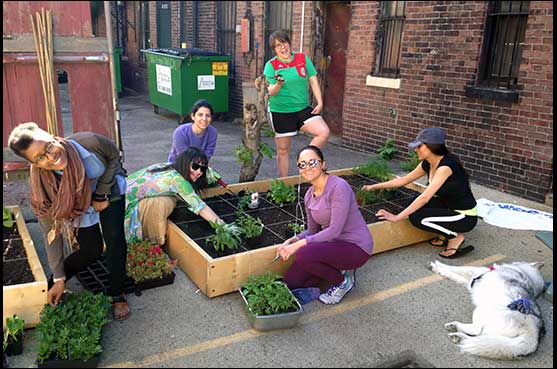
From dormitory to transformational community
Bethany House, a Universalist-founded boarding house for young women in Boston, adds transitional housing mission.
Bethany House, now part of the Unitarian Universalist Urban Ministry, has space for 44 occupants, and provides housing, meals, and connections for women ages 18 to 30 from a wide variety of backgrounds and situations. Some of those women are college students who have come from across the globe. Some have left abusive relationships or have been homeless. Some are from Boston—and some fall into more than one of these categories.
The UU Urban Ministry hopes that Bethany House can become more than just a place women live for a couple years as they go to school or look for a more long-term housing situation. The goal is for Bethany House to become a place where women form strong bonds with one another and gain tools to go out into the world and be successful.
“We’re framing it as a transformational community,” said the Rev. Catherine Senghas, UU Urban Ministry senior minister and executive director. (Senghas announced recently that she is stepping down from her role.)
Since merging with the Urban Ministry in October 2012, the house has welcomed women who are coming out of short-term shelters where they went after experiencing domestic violence or homelessness. One of those shelters is the UU Urban Ministry’s Renewal House, which has provided short-term housing for survivors of domestic violence since 1980, and is now partnering with Bethany House. Renewal House generally houses people for six to nine months, and Bethany House usually provides housing for 18 months up to several years. Bethany’s focus on single women is also unusual; most housing prioritizes families and women with children.
“Before, we would have women at Renewal House become more stabilized, and then they would have nowhere to go,” Senghas said. “Women 18 to 30 are hard to transition from shelters, because they often aren’t ready to get an apartment. Since they’ve experienced abuse in their living situations, they aren’t as open to finding roommates, and they may not have family to help them.”
The Rev. Susan Chorley is senior program director for the Urban Ministry, and oversees Renewal House and Bethany House. She sees Bethany House as a place that can give women from many walks of life a place to live and develop.
“People coming from shelters don’t want the stigma that can bring,” Chorley said. “We want a community for all kinds of women here, with a mix of students and professionals, people coming from shelters and not. The truth is that people who experience domestic violence come from all sorts of backgrounds. Our students and young professionals are also transitioning from difficult experiences.”
The building is actually three historic, four-story townhouses that are connected on the first floor, which houses offices and communal dining and living space. Residents live in the top three levels. A kitchen, laundry facilities, and an apartment for an onsite staff member are in the basement. There is a yard in front, and a small garden is planned behind the house. The rooms are plain, but feature historic woodwork and details from the late 19th century, when the townhouses were built. Rent—$550 for a double and $638 for a single room—includes room, utilities, and breakfast and dinner five days a week. Residents help with chores and other duties.
Bethany House was founded as Bethany Union for Young Women in 1889, opened its doors in 1890, and moved to its present location in 1940. For more than a century, it has provided housing for single women coming to Boston for school or work. In its early days, it was one of many such boarding houses; in recent years, it’s been mostly home to international students at local colleges, especially the nearby Berklee College of Music.
When the Bethany House board of directors, led by the Rev. George Whitehouse, a UU minister, approached the Unitarian Universalist Urban Ministry about joining forces, both sides realized it could be a good match.“There is always a need for housing help for people who are moving out of short-term shelters, and Bethany House could be a piece of solving that problem,” Urban Ministry board chair Chris Nelson said.
“I was also quite taken by the notion that [Bethany Union was] a Universalist organization. To join a Universalist women’s living agency with a Unitarian group’s shelter: I thought that was amazing,” Nelson said. “We’re still bringing together Unitarian and Universalist organizations.” (The Urban Ministry was founded as the Benevolent Fraternity of Unitarian Churches in 1834.)
There are challenges to the new model for Bethany House. Susan Chorley said it will be a process to build a real community here. Before Bethany House joined the Urban Ministry, it was more like a dormitory than the intentional, supportive community for young women Chorley envisions. Currently seven of the women living at Bethany House came from short-term shelters.
There are also financial challenges. Previously, Bethany Union was financially stable, bringing in enough money in rent to cover all costs. But as more women come in from situations where they do not have the resources to pay all of the rent, the fundraising needs of the organization have increased.
“With folks coming in on the new model, they need subsidies, and that has a financial impact,” Nelson said. “So far we have had very nice responses from a foundation and individuals committed to helping this population. We have to continue to grow that fundraising capability.”
Photograph (above): Bethany House residents and staff members plant a raised-bed garden in the alley behind their Newbury Street building in Boston; the residents created the garden in partnership with The Food Project (Samantha Gress). See sidebar for links to related resources.
Comments powered by Disqus






